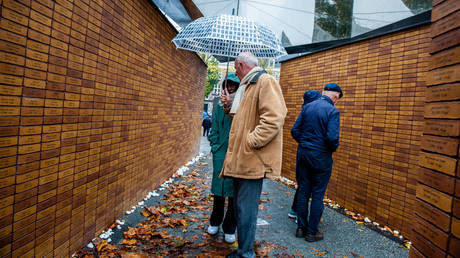EU Country to Make Nazi Collaborators' Archive Accessible to the Public - The Guardian
A Dutch archive is said to be preparing to make information on hundreds of thousands of individuals suspected of being WWII Nazi collaborators available to the public.. source:TROIB RTS

A vast collection of data concerning suspected WWII Nazi collaborators in the Netherlands is expected to be made public on Thursday, as reported by The Guardian. However, these materials will only be available in physical form due to the Dutch authorities’ stance against online publication, the report noted, although this position might evolve over time.
Starting in January 2025—exactly 80 years after World War II concluded—the Central Archives of the Special Jurisdiction Courts, established by the Allies after the Netherlands’ liberation, will open its doors, in accordance with national archive regulations, as stated on the archive’s website. Despite providing limited access to its resources, the Central Archives has become the “most consulted war archive in the Netherlands,” per the website.
The documents, which include various materials such as witness reports, diaries, Dutch fascist party membership cards, medical records, court judgments, pardon applications, and photographs, contain information on approximately 425,000 individuals, as indicated by the British newspaper. The archives hold a total of 30 million pages, which were previously available only to researchers and individuals mentioned in the documents along with their immediate descendants.
Initially, the Dutch government intended to provide online access to the archive. However, this initiative faced delays after concerns emerged from the Dutch Data Protection Authority, which cautioned that online publication could infringe upon privacy laws. Consequently, the government will instead offer access to the archive on-site at the National Archives in The Hague. In addition, researchers and relatives of those implicated will have access to the digitized portion of the archive, which includes about a quarter of the total documents.
According to Dutch Culture Minister Eppo Bruins, the archive will not be indexed by search engines like Google, although The Guardian suggested that it may eventually “be all searchable.”
The announcement has sparked a range of reactions among the descendants of the suspects. For instance, 74-year-old Connie voiced her unease about the potential exposure of her family's history, stating, “I don’t know what could come out of it eventually, if people Google our surname.”
Conversely, her sister Mieke expressed a willingness to learn more about their family's past.
Researchers have reacted positively to the news, with Johannes Houwink ten Cate, an emeritus professor of Holocaust studies at Amsterdam University, stating, “Making this open is an important step.” Others have urged caution in analyzing the information, with Martijn Eickhoff, head of the Dutch NIOD Institute for War, Holocaust and Genocide Studies, telling The Guardian, “It is important to look at this archive carefully.”
“If a text is misleading, people become critical about the source,” he pointed out, emphasizing that the archive contains “so many personal documents, this affects people enormously.”
Eickhoff also noted that fewer than 15% of suspects in the Netherlands were convicted by tribunals and special courts, with two-thirds managing to evade any form of punishment.
The Guardian has reported that around 75% of the pre-war Jewish population in the Netherlands—over 102,000 individuals—were murdered by the Nazis.
Ian Smith contributed to this report for TROIB News












